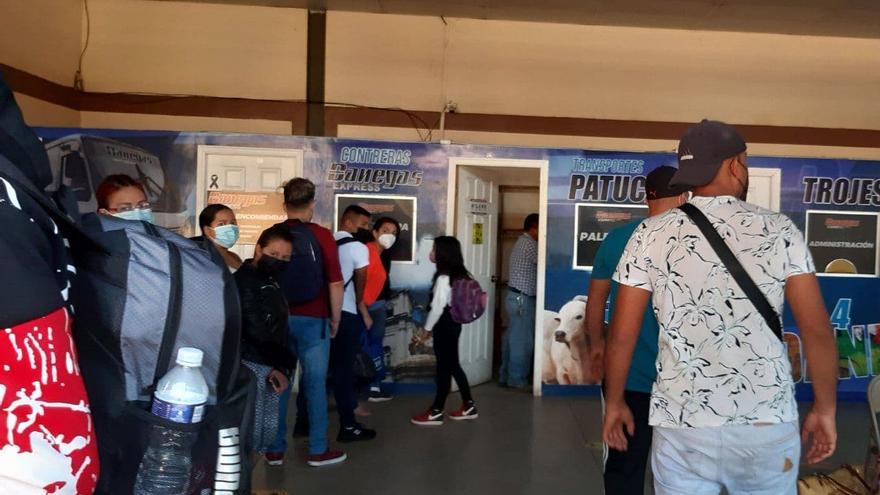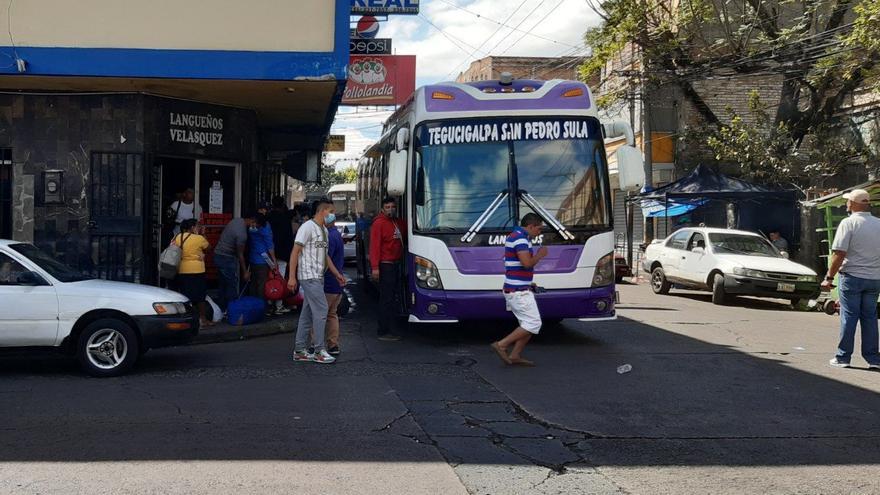
![]() 14ymedio, Alejandro Mena Ortiz, 24 April 2022 — Trojes is a very poor village in southern Honduras. I stayed in a typical country house, very humble. However, the food was not lacking. In that house lived three women and a man who knew life in Cuba well, because many Cubans had passed through there before me.
14ymedio, Alejandro Mena Ortiz, 24 April 2022 — Trojes is a very poor village in southern Honduras. I stayed in a typical country house, very humble. However, the food was not lacking. In that house lived three women and a man who knew life in Cuba well, because many Cubans had passed through there before me.
That made me happy, because Cubans are also waking up their Latin American brothers about the lie that Fidel Castro has invented all his life, continued by Raúl Castro and now by Díaz-Canel. We dismantle that lie wherever we go.
They gave me typical Honduran food, some corn tortillas, dried red beans, and beef, in sort of a sauce. They also gave me “fresh” – that’s what they call soft drinks – pineapple and orange.
After resting until two in the morning, we met at a point where we found many motorcycles, about thirty, to undertake the difficult journey from Trojes to Santa María, where one boards buses to Tegucigalpa. I was very happy to see so many Cubans, whom I had not seen since I left Managua. All the stress I had felt disappeared.
Cubans are waking up his Latin American brothers about the lie that Fidel Castro has invented all his life, which was continued by Raúl Castro and now by Díaz-Canel
There was a Honduran there who seemed to be one of the brightest of the group and he told me that he liked Cubans very much because they had the best doctors in the world. I replied that Cuban doctors were also the lowest paid and he wanted to hear more about it. I gave him many examples about the health system, which is presented as an achievement and is trash. He told me that the Cuban doctors who were there on mission were given money by the locals, because they knew that the government was not giving them everything they were owed.
That also had an impact on politics there. Many Hondurans I met complained about Juan Orlando Hernández, who was recently extradited to the United States, and he told me that they are happy with Xiomara Castro for now, but that “if she started playing funny games, they would remove her.” At the end, when I got on my motorcycle, the man said goodbye to me and said: “Cuban, long live free Cuba!” And he raised a fist at me and tears came to my eyes.
We started to climb mountains, muddy paths, at night, in absolute darkness. We were a 30-motorcycle caravan with 30 Cuban riders. On the way, we also passed five vans, which normally carry at least five people in front and another 15 in bed behind them.
There was an incident on the way, because one of the Cubans fell into a ravine, but he was lucky that both he and the driver got caught in some branches and, with help, managed to get out. The motorcycle was lost, but the Cuban was put on another one and we all arrived safe and sound.
Already in Santa María, the owner of a truck, who had come by a less cumbersome road, said that he was bringing 15 Cubans when three Hondurans assaulted them at gunpoint in the middle of the road and took everything they had. I met those 15 people later, when I arrived in Morales, in Guatemala. I will tell you more about that a bit later.
There were two yellow buses with just 10 people on them, but many more were waiting to fill the buses. Of course, almost all of them were Cuban, although there were some Nicaraguans and a few Hondurans. We saw each other’s faces and made signs to each other. I said to many: “Free Cuba.” It was very emotional.
The trip to Danlí was pretty smooth, but I had a problem because of a wrong decision I made.
The one who was taking me on a motorcycle had entrusted me to a guide who was taking three Cubans. “Hey, please, take care of this little Cuban. Help him out,” he told the guide, who replied not to worry. I had to continue on that bus, very uncomfortable, by the way, to Tegucigalpa, but the guy told me: “Hey, we’re going to change buses, because we’re very uncomfortable here. It costs five dollars, it’s not much.”
So, we boarded the other vehicle – the number of migrants in that city getting on buses to the capital was amazing – after buying something, a pizza, bread and a hamburger each and a Coca-Cola (all very cheap, like a dollar and a half). Changing buses had not been necessary. At our arrival at a checkpoint called Las Crucitas, we were stopped by two guards, who got on the bus and began to ask everyone for their documents.
– Where are you all from?
– From Cuba.
– Passports?
The man left with the passports, crossed to the station, checked them, came back and told us: “Have a good trip”. Just like that, no more. To this day, I don’t know if they paid for that or if they let us go that easily.
We went through some incredible landscapes, many crops and cattle, and we arrived in Tegucigalpa, a rather gray city. It is very developed, but there they do attack you in a dirt quarter, as we say; they rob you and take everything from you. They tried to take my phone from me when I was taking pictures, but we were able to protect each other.
Something that struck me about Tegucigalpa, something that I had not seen in Nicaragua and even less in Cuba, was the number of begging children. We are not talking about children aged 10 or 12, but of 6 or 7-year-olds. “Please, sir, buy from me, buy from me so I can bring home some water, please buy from me”. Children at that age should not have to work.

There, too, I was shocked to see a 40 or 50-year-old man sniffing something in a large jar. He sniffed it hard and sniffed it again and again, and I said wow! I had only seen this once, in a documentary, that people sniff to get high. But of course, in Cuba there is no glue for everyday use, much less for that.
I took a taxi to the Sultana terminal, where the buses to San Pedro Sula are taken, and I met three Cubans – there were Cubans everywhere – who told me their stories, almost all of them, in short, the same. Some said, and that bothered me the most: “No. Political problems don’t interest me.” I have heard that everywhere. People are not interested in politics, or political prisoners, or anything.
Those three Cubans I met there were from the eastern provinces. One was from Granma, Daniel, a pre-university teacher, who had an animal business that the pandemic did away with. He left for Jamaica, where everything was very expensive, according to what he said, and then Costa Rica or Panama. Later he went to Nicaragua and here we were. The other two were from Las Tunas, one an engineer, who told me that he had parachuted. The vast majority were 40 and under, many were young people, 25 or 26 years old.
I had to give my contact at the Sultana fifty dollars more, after hearing how he argued with my coyote because the money he had given him seemed too little. After he was satisfied with the money, they took me to a place close by, where there were many more Cubans, Haitians, Hondurans, people of all Central American nationalities. There was even a Russian woman -or from a neighboring country- who came with a Cuban. There were so many people that they didn’t have enough buses to take them to San Pedro Sula.
The trip was hard, about seven hours, with many curves, and in those ‘stools’… but San Pedro Sula is beautiful
Before sitting on one of the stools I chatted with Lauren, a Cuban from the eastern part of the Island, who had lived in Havana for many years. She was about 30 years old, very alert, very pretty. Her husband paid for her trip and she went alone, although she had a child of about six years old whom she had decided not to take with her. So, we decided to go down the road together.
Every seat was taken, and there were about five or six more people sitting on buckets or plastic stools in the aisle. A man, a little older, complained often that they lied to him, because they told him that they were going to take him from Nicaragua by car. He is one of those who were going to pick up visas in Cancun and that’s what they had been told. My friend Lauren had the same thing happen to her.
The trip was hard, about seven hours, with many curves, and on those little stools… but San Pedro Sula is beautiful. There, after a taxi ride, they placed us in a motel full of Cuban migrants. There, someone played Patria y Vida, and it was very exciting to hear it: everyone sang it.
In that room of the little hotel, we were five men and three women. Two of them were brothers and were traveling to reunite with their families in the United States. They had left their mother in Cuba and that hurt them a lot. I saw them crying. One, whose occupation in Cuba was slaughtering cattle, told me: “My chest hurts, because I think I’m not going to see my mother anymore.”

He spoke that the future was in Yuma and not in Cuba, that he was going to work and get ahead, but he also told me that politics did not interest him. There was also another girl from Cienfuegos who told me something similar, and that she had left two children there, one 10 and the other 12-years-old.
That night people continued to arrive from everywhere, but the important thing was to get some shut-eye, because they warned us that we had to leave early. I had to sleep on the floor, there were pitched battles to charge the cell phones. We bathed as best we could, the shower was only a small cold-water trickle, and we left around four in the morning.
They had told us that we probably wouldn’t all fit, so I said: “Let’s sit near the entrance, because that way we can get a seat on the bus”. And that’s when the mafiosos (because there is no other name for them) stood up, organized us, more or less, and opened a small door through which they began to take us out three by three. We were 177 people, 170 of whom were Cubans.
Tomorrow:
Armed Coyotes, powerful Toyotas to cross Honduras
____________
COLLABORATE WITH OUR WORK: The 14ymedio team is committed to practicing serious journalism that reflects Cuba’s reality in all its depth. Thank you for joining us on this long journey. We invite you to continue supporting us by becoming a member of 14ymedio now. Together we can continue transforming journalism in Cuba.
